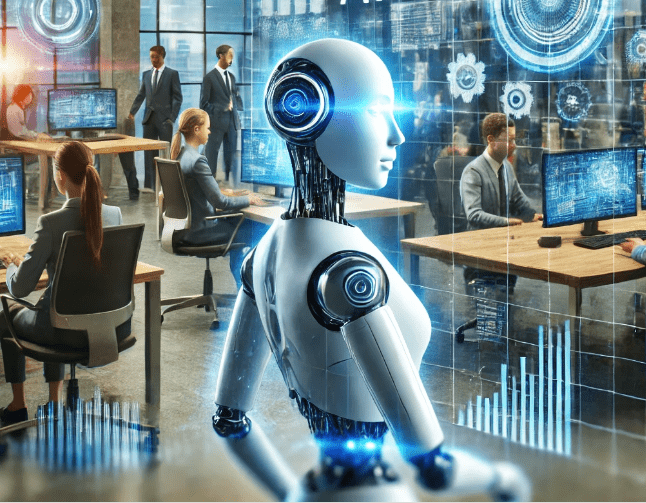Artificial Intelligence (AI) is profoundly transforming the way we work. Indeed, task automation, virtual assistants, and predictive analytics are fundamentally reshaping both businesses and professions. On one hand, some see this advancement as an opportunity for progress. On the other hand, others fear a massive loss of jobs. As a result, a fundamental question arises: are we truly ready to rethink our relationship with work and adapt to this new environment?
1. THE IMPACT OF ARTIFICIAL INTELLIGENCE ON THE JOB MARKET
First and foremost, it is important to emphasize that AI significantly enhances productivity. By automating repetitive tasks, many companies can optimize their processes and reduce costs. However, this evolution also has a downside: several professions, particularly in industry and services, are at risk of being replaced by intelligent machines.
Moreover, the rise of AI is not only about job elimination. In fact, it also promotes the creation of new professions related to the management, development, and ethics of these technologies. Thus, rather than completely eradicating human labor, this innovation actually redefines and redirects it toward new skills.
2. CHALLENGES FOR WORKERS AND BUSINESSES
Given this transformation, workers must adapt quickly. On one hand, acquiring new technical skills, especially in the digital field, is becoming essential. On the other hand, soft skills such as creativity, empathy, and collaboration are also gaining increasing importance.
Furthermore, this transition does not come without risks. As some professions evolve, others become more precarious. Therefore, it is crucial for businesses, in collaboration with governments, to invest in continuous training and professional retraining in order to mitigate the inequalities generated by AI.
3. TOWARD A FUTURE WHERE HUMANS AND AI COEXIST
Rather than seeing AI as a mere substitute for human labor, it is more relevant to consider it as an optimization tool. Indeed, when used effectively, it can significantly reduce repetitive tasks and allow employees to focus on higher-value missions.
Additionally, it is essential to establish an ethical framework and strict regulations so as to prevent abuses. Without such measures, AI could exacerbate inequalities and further destabilize certain sectors. Nevertheless, several initiatives are already emerging with the aim of promoting a smoother transition, where humans remain at the heart of decision-making.
In summary, Artificial Intelligence (AI) represents a major transformation in the world of work. However, rather than perceiving it as a threat, it is essential to anticipate and adapt to it wisely. By developing new skills and rethinking our professions, we can make the most of this revolution. Ultimately, the future of work will depend on our ability to collaborate with this technology while ensuring that humans remain central to the workforce.
